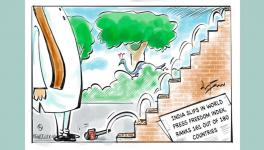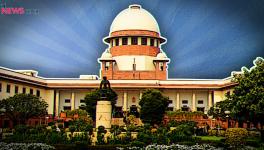Sectarianism Will Not Make Lockdown Crisis Go Away
Democracy has been described as the “least worst” form of government. The problem with this witticism is that democracy is not a simple analytical category. Systems of government labelled democratic are so disparate that they are irreducible to an archetype. The bigger problem is that democracy is often reduced to one form: liberal democracy as it is practised within the matrices of capitalist economies and bourgeois societies. This form of government that originated in Europe and was exported as an idea to colonies, some of which adopted it after decolonisation.
The further problem is that “liberal democracy”, which is not the only form of democracy either in theory or reality, in its idealised form does not conform to practice anywhere. Extrapolated to postcolonial countries it falls far short of everything that theorists crack it up to be. The claim that it is based on equality and equal rights to which equal “citizens” have equal access is a fiction. In the cradle of its birth and the birth of capitalism, the nascent “liberal democratic” state was the instrument of the rising bourgeoisie, which it helped gain ascendancy by the use of legislative force and other forms of coercion. And the state, in its liberal democratic forms filled with fictional equalities and rights, remains the instrument of the bourgeoisie and other classes that form the ruling blocs in India and elsewhere.
There is, however, the question of legitimacy: The acceptance by people of all classes of its political and ideological values. The bourgeois hegemonic order is produced by a combination of coercion and consent. It establishes its legitimacy by successfully projecting its sectional interests—say, economic growth—as a universal good.
This is true of India as well. The caveat is that the precise combination of coercion and consent is always contextual and contingent. In critical conjunctures, the responses of regimes are crucial to the maintenance of hegemony through the continued production of consent. It is possible for a hegemonic order to break down unless regimes take evasive action. After World War II, such evasive action was taken in the developed world in the form of welfarism.
Faced with the Covid-19 pandemic, laissez-faire regimes are again taking evasive action by rolling out social welfare. The multilateral economic order has abandoned the shibboleths it treasured and woken up to the fact that unless security nets are provided, social unrest could become difficult to contain globally.
In India, a crisis of legitimacy should rationally brew because of the responses of the current regime. To assume, however, that this crisis will necessarily be taken to its logical conclusion would be wrong. It will have to be made to transpire. The Bharatiya Janata Party (BJP) regime seems to be offering a two-pronged response.
It appears that Modi and his party do not see the current conjuncture as one which could breed a challenge for the bourgeois liberal hegemonic order in general, and their actually illiberal regime in particular. The only way one can read the Union government’s steadfast refusal to execute what we could call minimally humanitarian programmes for citizens, who should theoretically be able to claim these as rights, is that it does not see a problem of legitimation and legitimacy, which is curious because Modi’s rise to power was powered by a misleading change of public image from accessory to sectarian pogrom to champion of development.
The relentless machine that powers the prime minister’s publicity campaigns carpet-bombs us with information about the initiatives that have brought “welfare” to the people, which often borders on falsehood. Given that “divider in chief” Modi wants to be known as “development guru” who gifted India with the cooked-up “Gujarat model of development”, the reluctance to commit to minimal social security is inexplicable.
The government has not even undertaken initiatives that would have barely cost anything, if that is the constraint, which it isn’t, but could have ameliorated the sufferings of millions. For instance, before clamping on the country a draconian lockdown at four hours’ notice, it could have made arrangements for migrant labourers to go home. The Uttar Pradesh government did it after the fact for a few thousand students preparing for examinations in Rajasthan and is only now considering doing the same for migrant workers.
In the meanwhile, on 20 April the government approved a proposal for the release of surplus rice in the warehouses of the Food Corporation of India (FCI) for the manufacture of ethanol, to make hand-sanitisers, instead of clearing stocks to create a countrywide, no-questions-asked food banks for those in need, not to be determined by complicated forms of means-testing. It would be better to err on the side of generosity.
Union food and consumer affairs minister Ram Vilas Paswan’s response, on 21 April, to criticism of the scheme was criminally complacent, and lacking in basic empathy and intelligence. After clarifying that only inedible rice would be used, which sounds like an afterthought, he said hand sanitisers would be made for distribution to the poor. Indeed. They will be given to people in slums in which the ideas of hygiene and “social distancing” are non-existent, because long-neglected infrastructural necessities for the simulacrum of a decent life just do not exist.
Clearly, this refusal to sign up to some form of welfare betokens a lack of concern about legitimation. This is because the regime’s strategy for maintaining the hegemonic order and legitimacy is being pursued by fuelling sectarian discord and persecuting Muslims as an example of setting an example.
Thus, first, the continued arrest of dissidents who had been protesting against the Citizenship (Amendment) Act, 2019, and the National Register of Citizens on trumped-up charges. Thus, too, the disproportionate arrests of Muslims in connection with the Delhi riots, while those responsible for inciting them remain free. The discredited Delhi Police operating under the diktat of a sectarian Union Home Ministry wills itself not to see that the Delhi riots were orchestrated by Hindutva bottom feeders.
These are in addition to Hindutva footsoldiers spreading incendiary content on social media encouraging people to prevent Muslims from engaging in gainful activities and even attack them physically. The government’s response has been to encourage this by inaction. Modi’s belated appeal doesn’t cut it.
Following up, the Union government has moved to muzzle the press. Over the past few days, three journalists in Kashmir have been charged under the Unlawful Activities (Prevention) Act and other “special” legislation. On 18 April, Masarat Zahra had been booked for uploading photographs on her Facebook account “which can provoke the public to disturb law and order”. The material she uploaded has already appeared in reputable publications nationally and internationally. A firestorm of protest has broken out, but will not bother the government, especially because it has suborned significant sections of the mainstream media.
Another freelance journalist, Mushtaq Ahmed, was detained and beaten by the police in Srinagar when he was out during the lockdown on professional—i.e. journalistic—work. On 18 April, again, Peerzada Ashiq, a correspondent for The Hindu, was summoned by the police to explain a report. He was booked on 20 April for spreading “fake news” despite having provided an explanation that prima facie sounds reasonable.
The messages are clear. In the first instance: Toe the line, because even in the midst of the pandemic sectarian mobilisation will be used as a trusted tool. In the second: keep shut. We have emergency powers, which we will not hesitate to use. India has recently fallen two places—from 140 to 142—on an annual press freedom index compiled by Reporters Without Borders. It attributed the fall to “pressure on the media to toe the Hindu nationalist government’s line”.
Worldwide, governments are taking recourse to special powers that invade individual freedoms, while regimes that describe themselves as democracies have moved to provide citizens with safety nets. Coercion and consent. Observers are speculating that the age of mounting inequalities and iniquities could be softened by a new welfarism—to save capitalism from its own hubris.
Not so in India, where even the formal freedoms of the liberal democratic order have been under threat, forgetting, for the moment, issues like the rights to nutrition, good health and the numerous other conditions under which the entitled consider life actually worth living.
The inescapable conclusion is that this regime does not believe that throwing the poor and the hungry under the bus to contain the Covid-19 pandemic will create a crisis of legitimacy, because majoritarian mobilisation will fill the deficit. This will be the sublimation of hunger into an anger that can be channelled to build a theocratic state.
Legitimate anger against the regime must be channelled for the emancipation of the people from totalitarianism and want. Come the end of the year, migrant workers, who have already voted with their feet, traversing thousands of kilometres to get home, will vote in Bihar. They will, one hopes, clear up misconceptions about hegemony and legitimacy.
The author is a researcher and freelance journalist. The views are personal.
Get the latest reports & analysis with people's perspective on Protests, movements & deep analytical videos, discussions of the current affairs in your Telegram app. Subscribe to NewsClick's Telegram channel & get Real-Time updates on stories, as they get published on our website.
























